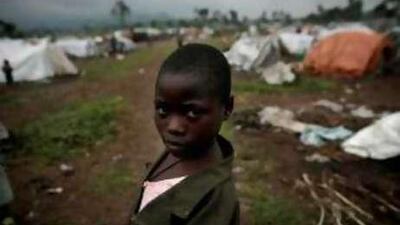KIBATI, DR CONGO // Blandine loved her family. During the day, her parents worked in the banana fields while the nine-year-old played with her two younger brothers. At night, when the work was through, Blandine's mother would cook potatoes for the family dinner while her father regaled her with stories. But the village in which Blandine lived in the fertile hills of eastern Democratic Republic of Congo was next to a strategic government army base. When rebel forces attacked two months ago, the entire town was forced to flee.
Amid the chaos of gunfire and scattering villagers, Blandine became separated from her family. "When I was running, I saw my family on the other side of the road," said Blandine, who is so traumatised that she does not remember her last name. The last memory Blandine has of her parents is of them calling to her from across the road. But Blandine became swept up in a sea of fleeing refugees and her family faded out of sight.
"They went into the forest and I stayed on the road," she said. "We separated. It was dark. I tried to reach them, but I couldn't. They were running faster than me." She sat down on the side of the road and wept until a passing villager, Jean-Claude Semitaga, scooped her up and they rejoined the throng heading for a United Nations camp in Kibati. For the past two months, she has lived in a plastic tent in this camp under the care of strangers. She does not know whether her family is alive.
"When I think about my family, I just want to go back," said the soft-spoken child with big eyes and tight, curly hair. There is a system in place to reunite separated children, such as Blandine, with their families. At least 1,700 children have lost their families because of the recent clashes between government forces and a Tutsi militia, according to a UN count. Unicef, the UN agency for children, and partner organisations place unaccompanied children with host families, which are often relatives or families from the villages in which the children fled. The sooner unaccompanied children are identified, the better their chances of survival, said Jaya Murthy, a Unicef spokesman.
"It is critical that they are identified as soon as possible because they are most at risk," he said. "They are exposed to abuse, exploitation, sexual violence and recruitment into militias. And they don't even have the protection of families. They are on their own." Once separated children are identified, Unicef's local partners go out into the field to track down the families. "It's kind of like detective work," Mr Murthy said.
Such organisations as Save the Children visit villages where lost children have fled and ask the residents if anyone is missing a child. Some of the villages are still occupied by the rebels, which poses a challenge. "It is difficult to reunify children in the villages that are still under control of the rebels," said Jonas Buchaguzi, a reunification specialist with Save the Children. "If we manage to reunify the children to rebel-controlled areas, sometimes they are forced to work for the rebels."
Unicef screens the host families to make sure the separated children will have a fostering environment while their family is being traced. The host families receive a small amount of compensation, but in this time of war, many families take in separated children out of a sense of obligation. "It would be very difficult for me to lose a child," said Mr Semitaga, who, along with his wife, is caring for Blandine and their two children. "That is why I took that child."
Some of the children who have lost their families are as young as two. Older children often live on their own without the protection of host families. Nathalie Wiseka, 13, takes care of her 11-year-old brother. Her mother died when she was young and she became separated from her father during the fighting in October. "We always talk about our father," she said. "I miss him. He was providing food for us. Now we have no one to provide food. I take care of myself now. No one helps me."
Parents who have lost children live in this camp alongside the separated children. Nyirambabazi Mbonabucha lost her seven-year-old son last month. The boy was buying sugar from the local market in the camp when a group of government soldiers passed through the camp fleeing a rebel advance. She has not seen her son since. "I think wherever the soldiers went, that is where my child is," she said. "We tried to look everywhere, but with no success. I have much pain when I remember my son. I hope even today that I may find him."
mbrown@thenational.ae

